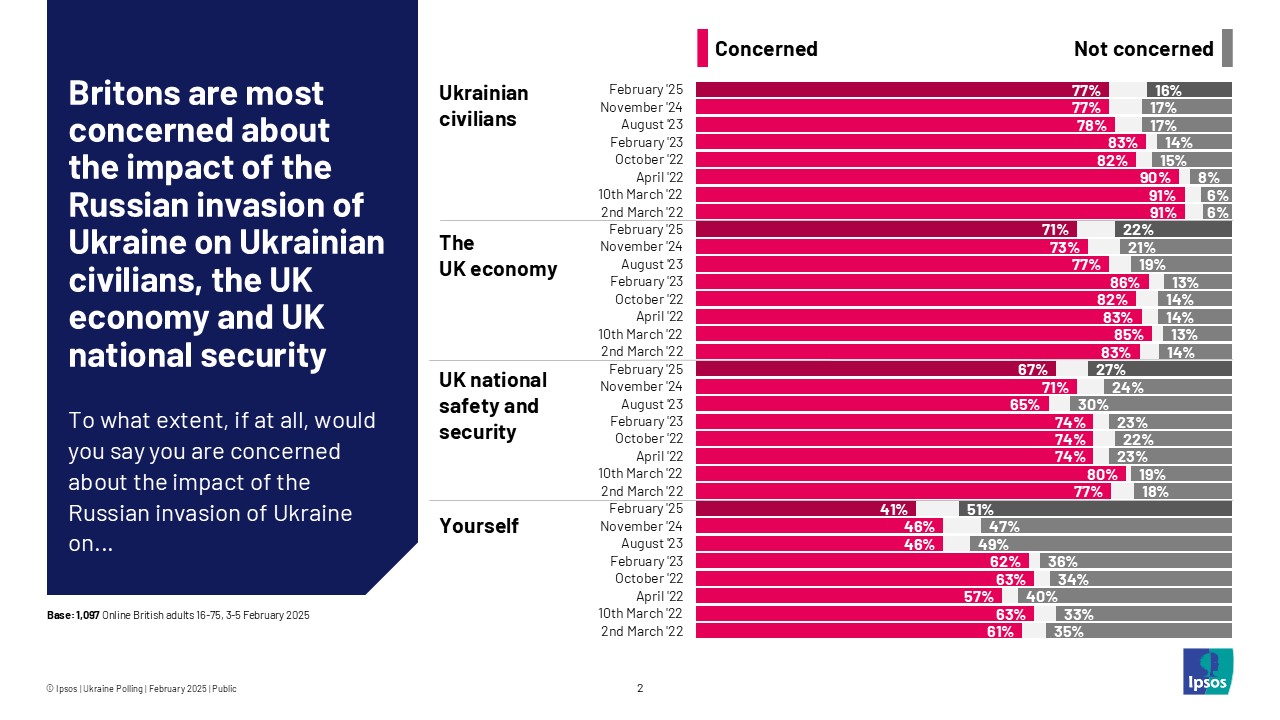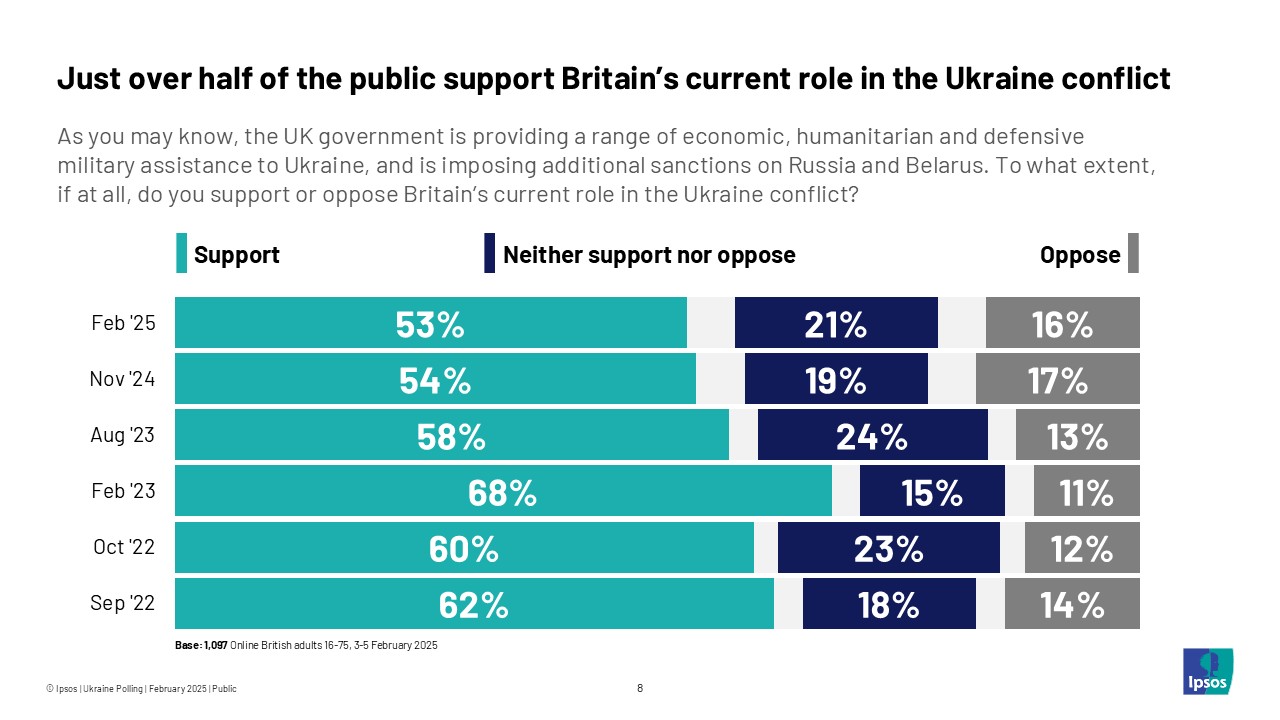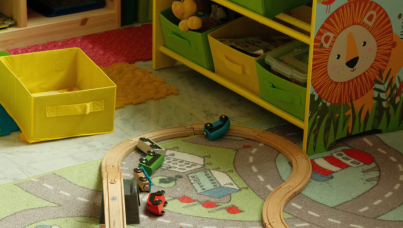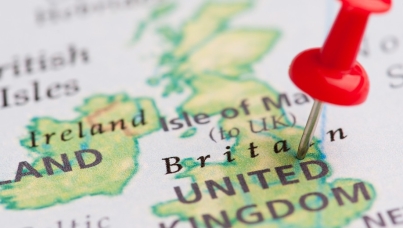British public opinion about the conflict in Ukraine, three years on
A new Ipsos poll reveals that the British public remains widely concerned about the ongoing war in Ukraine three years after it began, with a majority of Britons continuing to support Britain’s assistance to Ukraine and economic sanctions against Russia. The poll, conducted 3-5 February 2025, found that the British public is most concerned about the war's impact on Ukrainian civilians (77%), followed by the UK economy (71%) and UK national security (67%). Around four in ten (41%) express concern for themselves personally. Levels of concern have remained broadly similar since August 2023, though have lowered somewhat since the beginning of the war in March 2022.

British support for Ukraine
- Public support for Britain's role in the conflict continues, with just over half (53%) of Britons supporting the government's provision of economic, humanitarian, and defensive military assistance to Ukraine little changed since November 2024). The peak of support was 68% in February 2023.

- Just over half (52%) of those surveyed believe the UK has provided about the right amount of support to Ukraine (+6 pp from November 2024). 14% feel more support is needed and 18% think too much has been given.
- All groups are on balance supportive of the UK’s assistance to Ukraine, though 35% of 2024 Reform UK voters think too much support has been given (50% still think it has been the right amount).
- Half of Britons (53%) continue to think economic sanctions on Russia are necessary, even if it means energy and food prices remain higher (N/C from November 2024). Around one in five (18%) say sanctions aren’t worth the economic impact. This has been relatively consistent since the war began.
Impact of Trump victory
- Following the start of President Trump’s second term, half (50%) of Britons continue to say his election victory makes them feel more concerned about the situation in Ukraine. This is little changed from his election victory in November 2024. Reform UK supporters are the exception, with 44% of their 2024 voters feeling more reassured about the impact of his election on the war (26% more concerned).
- Overall, 19% think President Trump is doing a good job handling the Russian invasion of Ukraine, and 38% a bad job (fieldwork was carried out before his recent announcements about starting negotiations with Russia over the conflict).
Approval ratings for key actors
- Three in five (60%) Britons believe that Ukrainian President Volodymyr Zelenskyy has done a good job, compared to 12% who disapprove.
- Public opinion on the UK government's handling of the situation is divided, with one in three (34%) approving and just over a quarter (26%) disapproving.
- Britons are split on the European Union, with 27% believing it has done a good job and 26% believing it has done a bad job (33% neither, 15% don’t know).
Likely outcome of the war
- Britons are split over what they see as the likely outcome of the war. One in four, 26%, think the most likely way it will end is with Russia and Ukraine each holding on to whatever territories they hold when the conflict ceases, but almost as many, 23%, don’t know. 17% think there will be a return to the borders before the 2022 invasion, and 13% a return to the borders before the 2014 invasion – while 15% pessimistically believe the war will never end.
Gideon Skinner, Senior Director of UK Politics at Ipsos said:
Our latest poll, taken just before the third anniversary of the invasion of Ukraine, shows the British public remain concerned about the war and its implications both at home and abroad. While support for the UK's backing of Ukraine remains in the majority, the election of Donald Trump appears to have complicated the picture, with many Britons anxious about its impact on the situation. As US policy towards the conflict shifts with the arrival of the new administration and European nations discussing increasing defence spending, the conflict is likely to change considerably in the coming weeks and months. Even now, while the public remains supportive of Ukraine, there is no consensus over how the war is likely to end.
Technical note:
- Ipsos interviewed a representative sample of 1,097 adults aged 16-75 across Great Britain. Interviews were conducted online between 3rd-5th February 2025.
- Data are weighted to match the profile of the population. All polls are subject to a wide range of potential sources of error.




